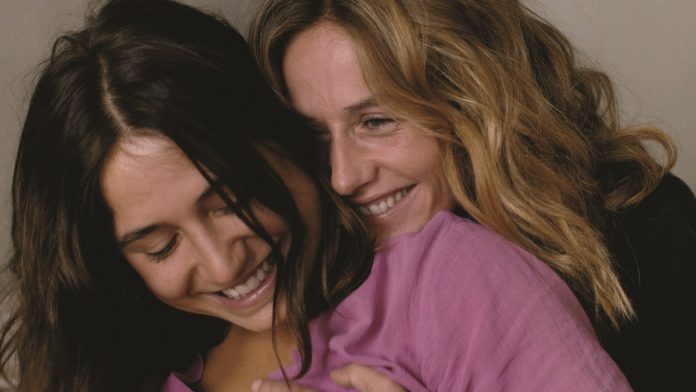THE story of a romance between a farmer’s daughter and a feminist in 1970s Paris forms the basis for Summertime, an engaging French morality drama from the director of the equally-impressive Leaving, Catherine Corsini.
In 1971 during the reign of Pompidou following the break-up with her girlfriend, Delphine (Izia Higelin) moves away from her position as assistant on her parents’ farm in the countryside to Paris. Whilst there, she becomes acquainted with Carole (Cecille de France) who she meets upon protecting her from an aggressive male she attempts to pickpocket from. Introducing her to her feminist work, a friendship develops.
Eventually, in spite of an awkward rejection, the two relent and become passionately involved in a relationship. All is fine until Delphine receives word that her father has become ill and her broke mother requires her return for help due to nobody else able to do so.
Time passes and Carole reunites with her on the farm where the relationship continues discreetly. But it finds itself tested as the risk of discovery awaits and the commitment of Delphine’s work on the farm force her to choose between love or family.
Acting as a drama that plays primarily as a relationship piece with an unexpected moral twist, Summertime manages to reward thanks to its strong portrayal of women and use of dilemma for helping to ramp up the drama.
As the film starts, we see Delpine living her life which suggests she should do something creative to benefit her. Enter Carole whose strength at standing up for her gender is demonstrated early when she humiliates a perceived anti-feminist at a convention.
When the friendship turns into something different when Delphine attempts to kiss Carole only to be rejected and a potential fallout being risked, there is a sense of cliche being bought in. But when the argument is forgiven and sealed with a passionate kiss in the streets, the love story that follows actually helps forgive the use of the rejection and actually helps the film on a storyline perspective.
The fact Carole is in the midst of a relationship, incidentally with a man, makes things understandably complicated and the apparent fear of social judgement helps maintain a level of importance for exposing the social risks of a same-sex storyline at the time.
Potentially running down the route of being a film illustrating mostly the ideals of feminism, in a vein reminiscent of Agnes Varda’s One Sings, the Other Doesn’t, the moral conscience that dominates the second half actually helps the film in spite of its risks. It does risk again becoming a cliche but its potential for slight concern is replaced almost immediately by something which does the film a favour when trying to act as a romance.
With Delphine’s father rendered unable to speak following his illness, the fact that she is morally bound to return to assist her mother away from her new life in the capital speaks for wondering what one could do if in that situation. If it is for a short time, that would be understandable to help out, but as the film progresses and looks more likely that will be her way of life for the foreseeable future, it asks which direction one should go.
That Delphine appears to have a life heading somewhere in Paris and that being greatly affected by a duty to help her mother as she can’t afford to get another worker and will never sell the farm asks what is really the right thing to do, for future’s sake.
Additionally, the problem is also put to Carole given that she goes on to leave her boyfriend for her same-sex lover and has the added problem of leaving her city life behind for love. In one scene, she explains with Delphine’s father that she is there not for the countryside but solely for Delphine, aware that his inability for speech is not the same for his mindset.
The climactic segment does have a mixed feeling to it, but with it comes in the final scene that states that what is decided makes it a solid decision. On multiple times, the film risks aggravating the audience but finds redemption quick enough which makes the viewing as a whole a rewarding one.
The relationship between the two leads are genuine and both actresses do a secure job at making us observe their relationship and wanting a resolution that can be helpful to both characters. It maintains our interest because it is no conventional love story and where there are moments of happiness, there are obstacles and it is those that help make the film stand on its feet as a love story with a ground for integrity.
Summertime succeeds not just because it plays as an interesting love story but one which joins a recent amount of works paying tribute to the spirit of the female gender.






























